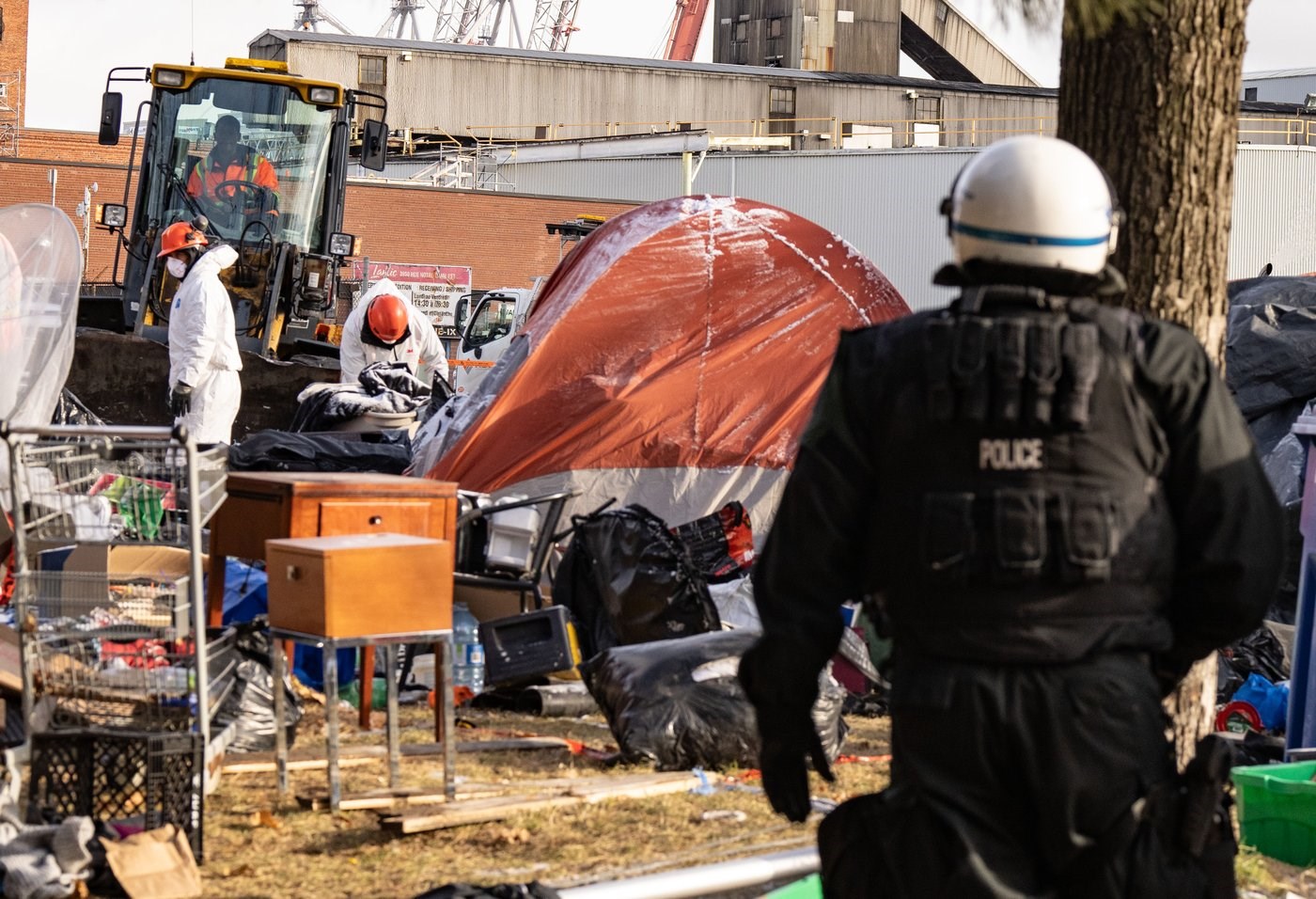
Police look on as workers from the Transport Department dismantle a homeless encampment in Montreal on Monday, Dec. 2, 2024. THE CANADIAN PRESS/Christinne Muschi
Republished July 10, 2025 - 3:46 PM
Original Publication Date July 10, 2025 - 11:07 AM
MONTREAL — The City of Montreal won't promise to stop dismantling homeless encampments, in spite of a recommendation from a study it commissioned to find solutions to the growing problem of homelessness in the city.
City officials on Thursday said taking down encampments is a "last resort" but at times it's necessary to protect the safety of people in and around the sites.
"The encampments are a bit like the tree that hides the forest," said Robert Beaudry, the city's executive committee member responsible for fighting homelessness, during a press conference at city hall. "What is the forest? ... It's the glaring lack of resources in Montreal, in Quebec, for people experiencing chronic homelessness."
His comments followed the publication of a new report that decries a lack of leadership in the fight against homelessness and calls on the city to boost resources for community organizations working with the unhoused.
The nearly 300-page report, published Thursday by Montreal's public consultation office, says the city should stop dismantling homeless encampments until it develops a policy governing when and how they can be taken down.
The report follows public consultations that Montreal announced last year, as city officials grappled with the rising number of people experiencing homelessness amid public opposition toward services such as shelters and supervised injection sites.
Philippe Bourke, president of the consultation office, said dismantling encampments simply pushes the problem of chronic homelessness out of sight, without resolving it.
"There are problems of social cohabitation around the camps, and the dismantling of the camps creates other problems of social cohabitation," he told reporters Thursday.
The report says the city should instead create safer living conditions in the encampments by improving access to drinking water, toilets, waste collection and electricity.
But Beaudry pushed back on that recommendation, saying such attempts have not gone well in other cities. He pointed to Vancouver, which announced last fall it would close its only sanctioned homeless encampment due to health and safety risks. Earlier in the year, a cleanup crew had removed more than 90,000 kilograms of debris and other material from the site.
Beaudry said Montreal instead aims to improve services for its unhoused population, though he did not provide numbers. The report found that community organizations working to help those experiencing homelessness are "seriously lacking the resources to do so."
"We are committed to adding resources," Beaudry said. "We also expect our partners, the federal government, the provincial government, to move in the same direction as us."
Montreal Mayor Valérie Plante said the report shows a lack of resources is at the heart of the problem.
"As a city, we will continue our efforts and go even further," she said on social media. "But we can't do it alone. We have to play as a team, with Quebec."
The report found there is a "major governance deficit" in the fight against homelessness in Montreal and the rest of the province, and a lack of clarity about the responsibilities of different governments.
Bourke said there is a "blame game" between different levels of government when it comes to addressing homelessness. "It greatly reduces the capacity for action," he said. "There are resource losses, there is burnout, and we cannot achieve the objectives we set if we don't address this."
The report's first recommendation is that the city should formally declare that Montrealers experiencing homelessness are citizens equal to those who are housed -- a symbolic measure that Beaudry called a "no-brainer." He said city council will make an official declaration during its next meeting.
The consultation office also wants the city to ask health authorities to establish more supervised drug-consumption services in Montreal. "The limited availability of this type of resource in Montreal is detrimental to public health and social coexistence," the report says.
According to the report, there were 4,690 visibly unhoused people in Montreal in 2022, up from 3,149 in 2018. However, Bourke said the official numbers don't account for "hidden homelessness," including people who live in their cars or who stay temporarily with family members or friends.
In 2022, nearly 60 per cent of unhoused people said they suffered from mental health problems, and 45 per cent said they had a medical condition or physical illness.
Indigenous people accounted for 13 per cent of the visibly unhoused population, despite making up just 0.6 per cent of Montreal's overall population.
This report by The Canadian Press was first published July 10, 2025.
News from © The Canadian Press, 2025